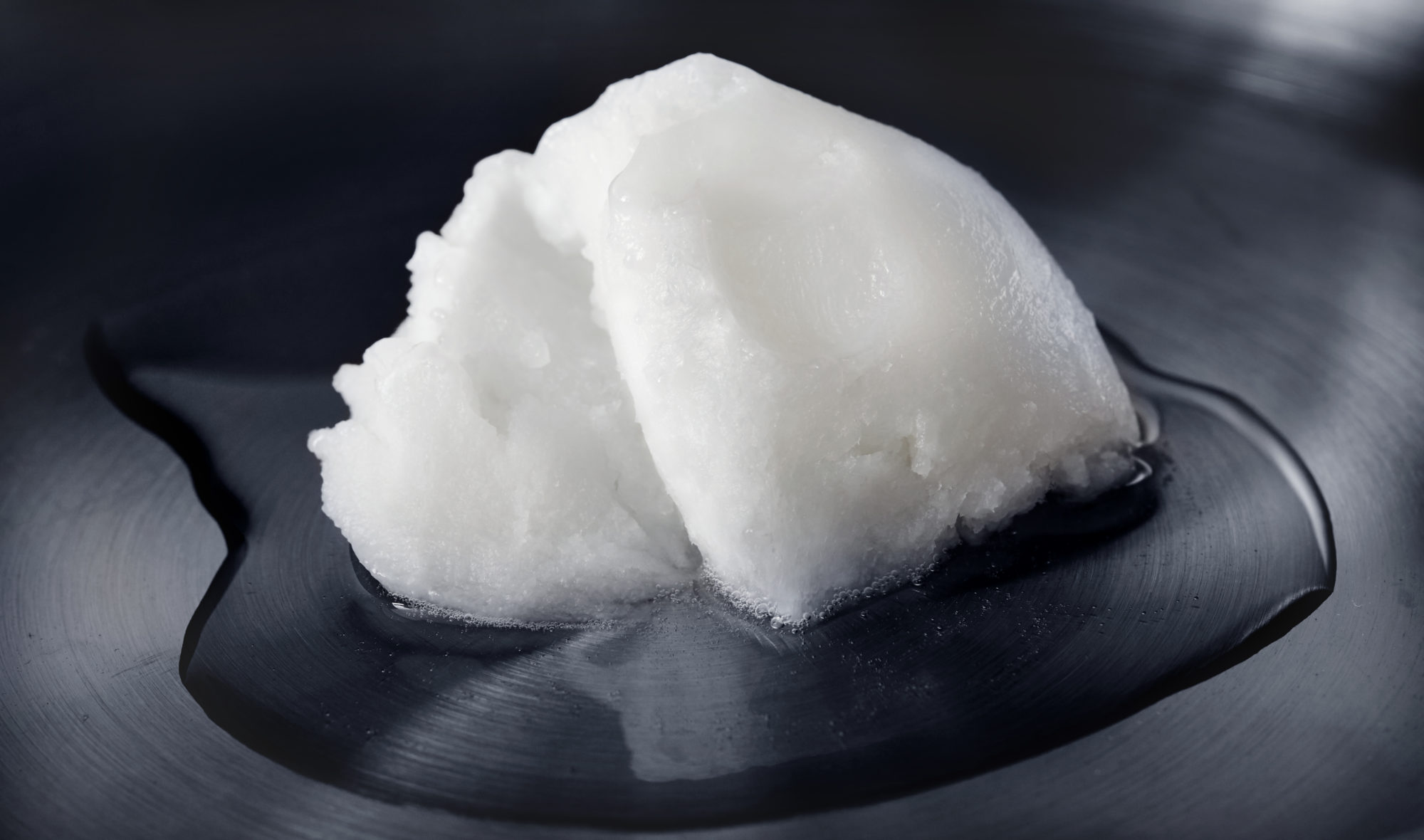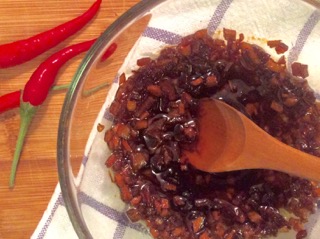Coconut Oil


Coconut oil is an edible oil extracted from the fresh or dried meat of the coconut. It is high in saturated fats and is also uniquely high in medium-chain fatty acids, which offer health benefits. Coconut oil has a delicate coconut taste and a long shelf life, making it a favorite with many discerning cooks.
Coconut oil is an edible oil extracted from the fresh or dried meat of mature coconuts.
Coconut oil is high in saturated fat and is also uniquely high in medium-chain fatty acids, which may have additional health benefits.
Coconut oil will look different depending on how it is stored. When stored at temperatures above 24 °C / 76 °F, coconut oil will appear as a clear liquid. In cooler temperatures, coconut oil will appear solid, opaque, and white.
Sometimes coconut oil is confused with coconut butter. Coconut butter is the puréed flesh of the coconut, while coconut oil is simply the expressed oil, pressed from the flesh. In contrast to coconut oil, coconut butter will remain white when exposed to heat. Because it also contains fiber, coconut butter has a thicker, grainier texture than coconut oil.
One tablespoon (or 13g) of coconut oil contains 116 calories, 14g of fat (12g of which are saturated fat), no carbohydrates, and no protein. It has no cholesterol and no sodium.
Coconut oil is high in saturated fat, but it is also uniquely high in medium-chain fatty acids.
Coconut oil can be purchased in most grocery stores and health food stores, and can be processed a little or a lot. Here are the differences between refined coconut oils (which are more processed) and virgin coconut oils (which are less processed):
Refined coconut oils
Refined oils are fairly tasteless and odorless because they are filtered and may even be deodorized and bleached. However, the refining process raises the smoke point of coconut oil, so it can withstand higher temperatures in cooking without degrading.
Most of the coconut oil you’ll find in the supermarket is refined. It is made from the “copra” (the dried, shelled meat of the coconut), and may be treated with solvents during the oil extraction process.
Refined oils are not created equal. Some simply use heat and mechanical pressing to remove the oil; these are called “expeller pressed.” Others are treated chemically with solvents, harsh detergents, and / or deodorizers in the extraction process. Still others are further chemically manipulated through a process called hydrogenation.
“Virgin” coconut oils
Less refined oils are usually labelled as “virgin” or “extra-virgin”. Note that when it comes to coconut oil, in contrast to olive oil, there is no regulation of either of these terms. Theoretically, any oil producer can use these terms.
However, in practice, virgin coconut oil is usually extracted via cold-pressing or centrifuge from fresh coconut meat. It’s also possible to extract coconut oil through a process known as “wet milling.” Here, the liquid (or milk) is first withdrawn from the fresh, raw coconut. The oil is then separated from the liquid. It’s not unlike the division of cow’s milk and butter.
Virgin coconut oils will retain more of their original coconut flavor, so will be less neutral-tasting than refined coconut oils.
So, which type of coconut oil is best?
First, avoid hydrogenated oils. These are high in trans-fats, which are correlated with a variety of negative health effects.
Refined oils may have been exposed to chemical solvents during the extraction process, and therefore may be considered more processed than mechanically extracted oils.
Virgin coconut oil is the simplest and least processed form of coconut oil. Look for companies that use mechanical expeller-pressing, cold-pressing, or centrifuge, without the use of solvents, to extract their oils. They will likely be the most nutritious and best-tasting oils.
Coconut oil has a long shelf life, and is resistant to rancidity. It will keep in your pantry or fridge for up to two years. Most people prefer keeping their coconut oil on their counter or in a cupboard to keep it soft / liquid. When stored in the fridge, it becomes rock solid and rather hard to work with.
Coconut oil doesn’t need any special preparation. It may be eaten or used in recipes directly out of the jar. Coconut oil is rarely used as a salad oil, due to its solid texture, and therefore is more commonly used in cooking or baking.

This warm vinaigrette is a great topping for vegetables, rice bowls, fish, meat, or even eggs. It’s versatile, full of flavor, and keeps for a long time in the fridge.
Prep Time: 10 minutes Cook Time: 10 minutes Yield: garnish for 4-6 meals
Combine the shallot, ginger, garlic, chillies and coconut oil in a small pan over medium-low heat. Stir often, until the shallots and garlic become wilted and caramelized, about 10 minutes. Add the tamari and the rice vinegar and cook for 1 minute.
Remove from heat and serve, or refrigerate and keep for later.
Enjoy!
Precision Nutrition’s Encyclopedia of Food expands every single month as we highlight new foods and showcase beautiful food photography. If you’d like to stay up to date, simply click this link. From there, we’ll send you a FREE copy of our recipe book. We’ll also let you know when new and delicious foods are added to the site.
Coconut oil is an edible oil extracted from the fresh or dried meat of the coconut. It is high in saturated fats and is also uniquely high in medium-chain fatty acids, which offer health benefits. Coconut oil has a delicate coconut taste and a long shelf life, making it a favorite with many discerning cooks.